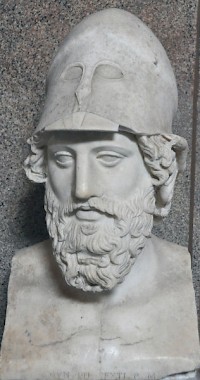Hagnon
Hagnon (†412?): Athenian military leader and democratic politician.

Hagnon, the son of Nicias, was one of the leaders of the Athenian democracy during its glory days, although he lived to see the beginning of its decline. He is mentioned for the first time in the History of the Peloponnesian War by Thucydides in the part that is known as the Pentecontaetia ("the fifty years", between the Persian War and the Peloponnesian War). The historian informs us that Hagnon, together with Phormio and a man who was also named Thucydides, brought forty ships to Samos, which was besieged by Pericles in 440/439.
A couple of years later, in 437/436 to be precise, Hagnon captured Ennea Hodoi, settled many Athenians and other Greeks in the town, and renamed it Amphipolis. This was an important event, because the Athenians had already tried to obtain this strategically important town several times, but had always failed. Archaeologists have discovered the remains of the piers of a bridge and city walls that were built at about this moment.
In the late 430s, several friends of Pericles were accused of impiety, probably to create problems for the powerful politician himself. His friend Anaxagoras, a philosopher, had to flee from the city; there were whispers about Pericles' wife Aspasia; and the sculptor Phidias had to explain how he had spent money that was meant for the statue of Athena in the Parthenon. Hagnon played a role, but we do not know if it was for or against the accused. It was rumored that, when Pericles could not steer clear of the accusations, he made the Assembly accept the Megarian Decree, which he knew would result in war with Sparta's Peloponnesian League. This is probably untrue, but it is also clear that the accusations were a serious problem for Pericles.
When the Spartans and Athenians went to war in the spring of 431 (the Archidamian War), Hagnon was elected general (strategos). In 430, when the Plague devastated Athens, he and a man named Cleopompus brought troops to Potideia, a northern town that was besieged. But they took the Plague with them, and their arrival did more harm than good. In 429/428, Hagnon was again in the north, as ambassador to the court of the Thracian king Sitalces. After this, he disappears from the historical record, to return in April 421, when he was one of those who swore the oaths of the peace treaty, the Peace of Nicias. Although exhausted, Athens had won the Archidamian War.
In the following years, the Athenians, led by Pericles' younger relative Alcibiades, pursued an ambituous policy, trying to make incursions in the Peloponnese and trying to conquer Sicily. In 413, the Sicilian Expedition ended in failure and Hagnon, by now an elder statesman, was asked to act as proboulos, which meant that he had to offer advise and propose legislation "to solve the present crisis as the situation may require". He had nine colleagues, which included the playwright Sophocles. It was an attempt to make the democratic system more moderate.
This is the last record on Hagnon's life. He had a son named Theramenes, a moderate oligarch who was to play an important role during the second half of the Peloponnesian War, the Decelean or Ionian War (413-404). As an oligarchic coup was staged in 411, and we hear nothing about Theramenes' father, we may perhaps assume that Hagnon died in c.412.